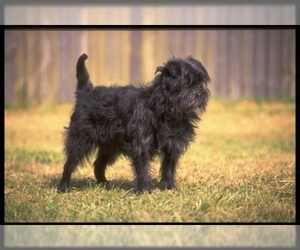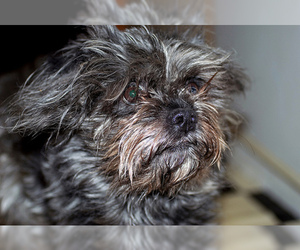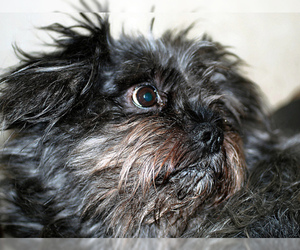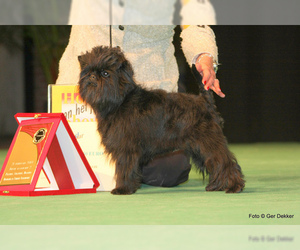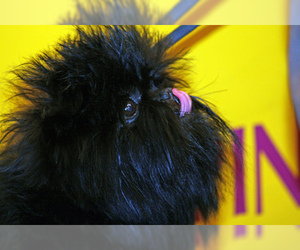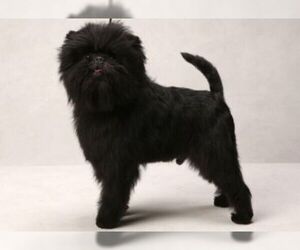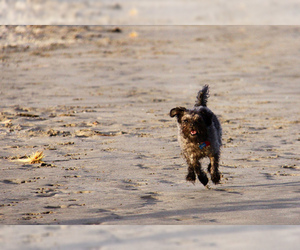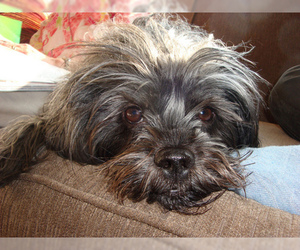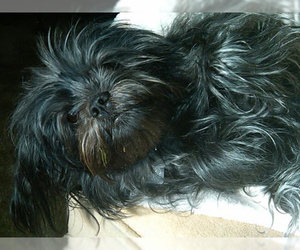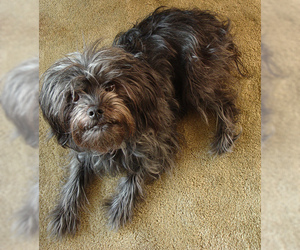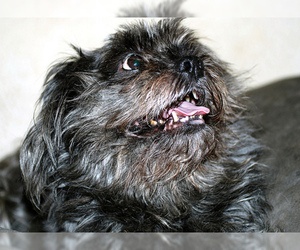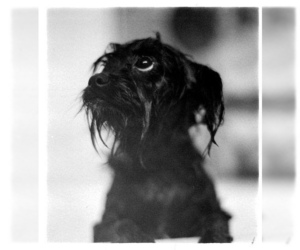
All about Affenpinscher dog breed
A.K.A. :Monkey Terrier, Affen, Affenpincher, Aaffenpinscher
Size
Grooming requirements
Exercise requirements
Good with other dogs
Watchdog ability
Energetic
Training requirements
Playful
Affectionate
Good with other pets
Good with children
Good with strangers
Winter
Summer
Healthiness
Protective
Life Span
| Pure Breeds | Member |
| Breeds A - Z | A |
| Breeds by Group | Companion Toy |
| Breeds by Trait | Hypoallergenic Low Shedding |
| Overview: | The Affenpinscher, often nicknamed the "Monkey Dog" due to its expressive, almost simian face, is a charming and spirited toy breed with German origins, dating back to the 17th century. Physically, they are small, sturdy dogs, typically weighing between 7-10 pounds, with a shaggy, wiry coat that comes in various colors, most commonly black. Their most striking feature is their distinctive facial hair, including prominent eyebrows and a beard, contributing to their impish look. Temperamentally, Affenpinschers are curious, playful, and fiercely loyal to their families, possessing a surprising amount of confidence and courage for their size. They generally adapt well to apartment living thanks to their small stature and moderate exercise needs, and can be good with older, respectful children, though their assertive nature means early socialization is key. While generally healthy, potential owners should be aware of breed-specific concerns such as patellar luxation and respiratory issues due to their brachycephalic (short-nosed) structure, particularly in warmer climates. |
F.A.Q.
All You Need to Know About the Affenpinscher BreedThe Affenpinscher, a charming and sturdy toy breed, hails from Germany, originally bred for vermin control. Often described as "monkey-like" (affen means monkey in German), these diminutive dogs possess an undeniable playful and confident temperament. Standing at just 9-11.5 inches and weighing 7-10 pounds, their physical traits include a wiry, shaggy coat, a distinctive facial "ruff," and an intelligent, inquisitive expression. Affenpinschers are suitable for families with older children who understand how to interact with a small dog, and they adapt well to apartment living due to their size. Their grooming needs are moderate, requiring regular brushing to prevent matting and occasional professional stripping. Exercise needs are minimal, satisfied with short daily walks and indoor play. While generally healthy, potential owners should be aware of common health considerations like patellar luxation and heart conditions. This loyal and entertaining companion makes a wonderful addition for those seeking a spirited, low-ergo, yet robust canine friend.
The average weight for an adult Affenpinscher is typically between 7-9 pounds. This compact breed generally falls within this healthy weight range, with very little noticeable variation between males and females.
Curious about the Affenpinscher height or "how tall is a Affenpinscher?" You've come to the right place!
The average height of a Affenpinscher, measured at the shoulder (from the ground to the top of their shoulder blade), typically falls within a range of 9 to 11.5 inches. This petite size is one of their defining characteristics!While there isn't a significant difference in height between male and female Affenpinschers, you might find slight variations based on individual genetics and breeding lines. Some dogs may be at the lower end of the range, while others might reach the upper limit. However, a healthy adult Affenpinscher will generally stay within this 9 to 11.5-inch bracket.So, if you're looking for a small, compact companion, the Affenpinscher's average size makes them a perfect fit for many homes!Affenpinscher colors primarily consist of black. While black is the most common and widely recognized color, the breed can also be seen in gray, silver, and various shades of red (ranging from reddish-brown to a lighter fawn). The American Kennel Club (AKC) officially recognizes black, gray, silver, and red Affenpinschers, sometimes with a small amount of white or lighter markings on the chest and feet. These AKC recognized Affenpinscher colors are standard for conformation and breeding.
There are no commonly accepted "rare coat types" or "exotic Affenpinscher variations" such as blue, lilac, merle, chocolate, or pure white within the breed, nor are these colors accepted by major kennel clubs like the AKC. Breeders focusing on breed standards will adhere to the recognized black, gray, silver, and red variations. Potential adopters or buyers should be wary of claims of "rare" or "exotic" Affenpinscher colors like blue, merle, or chocolate, as these are not characteristic of the breed and may indicate misidentification, mixed breeding, or unethical breeding practices. When comparing coat types and pricing, stick to the established and recognized color palette for authentic Affenpinschers.The Affenpinscher personality is often described as bold, curious, and playful, with a surprising amount of spunk for their small size. They are typically loyal and affectionate with their families, forming strong bonds. While generally friendly with familiar faces, they can be a bit reserved or even wary of strangers, making early socialization crucial.Their adaptability to apartment living is excellent due to their small stature, but they still require daily exercise and mental stimulation to prevent boredom. Regarding behavior with children, Affenpinschers are generally better suited for homes with older, respectful children who understand how to interact gently with a small dog. Their patience for rough play can be limited, and they may not tolerate teasing.When it comes to other pets, with proper early socialization and supervision, Affenpinschers can coexist peacefully with other dogs and even cats. However, their terrier instincts might lead them to chase smaller critters, so introductions should be handled carefully. The temperament of Affenpinscher is one of intelligent charm mixed with a confident, sometimes mischievous, spirit.
The Affenpinscher temperament is often described as bold, inquisitive, and charmingly mischievous. These little dogs are loyal companions and thrive on human interaction, forming strong bonds with their families. They are generally friendly and can be quite sociable with known individuals, though they may be reserved with strangers initially. Their compact size makes them highly adaptable to apartment living, provided they receive sufficient exercise and mental stimulation. Affenpinschers are known for their intelligence but can exhibit a stubborn streak, requiring consistent and positive training. They are relatively sensitive dogs and respond best to gentle handling. Regarding children and other pets, Affenpinschers can do well with older, respectful children who understand how to interact with small dogs. Due to their small size, they can be easily injured by boisterous play. While they can coexist with other pets, especially if raised together, their terrier-like instincts might lead them to chase smaller animals. Proper introductions and supervision are always recommended to ensure harmonious companion dog behavior.
Affenpinscher Care: Daily Maintenance & Health TipsAffenpinscher care involves regular grooming, moderate exercise, and careful dietary management. Their wire coat requires weekly brushing and professional stripping/trimming every 2-3 months to maintain its texture and minimize shedding. While a relatively low-energy dog breed, daily short walks or indoor playtime are sufficient to meet their exercise needs.Due to their brachycephalic (short-nosed) anatomy, Affenpinschers are sensitive to extreme temperatures. They are prone to overheating in hot weather and should be protected from the cold. Always provide access to fresh water, especially during exercise.Dietary considerations are crucial for how to care for an Affenpinscher. They can be prone to weight gain, so feed high-quality dog food in controlled portions to prevent obesity and ensure weight management. Regular dental care is paramount; daily brushing or dental chews help prevent common dental issues.Health tips for Affenpinscher also include attention to their skin and eyes. Due to their facial folds (wrinkles), daily cleaning may be necessary to prevent skin irritation or infections. Regular ear checks and cleaning (as needed) are also important. Beyond dental and skin issues, be aware of potential patellar luxation, heart issues, and respiratory problems common in brachycephalic breeds. Regular veterinary check-ups are essential for early detection and preventative care.
The Affenpinscher activity level is moderate, balancing short bursts of playful energy with significant periods of rest. Despite their small size, Affenpinscher exercise needs are not demanding, making them suitable for various households.Typically, Affenpinschers possess a lively spirit and enjoy engaging in interactive playtime. They thrive on short walks, usually 20-30 minutes per day, which can be split into two sessions. Indoor play, such as chasing toys or a game of fetch, also satisfies their need for mental and physical stimulation. They particularly enjoy being involved in family activities and can be quite entertaining with their antics.A key consideration for how active are Affenpinscher is their brachycephalic (short-nosed) anatomy. This makes them prone to overheating and respiratory distress, especially in warm weather or during strenuous exercise. Therefore, intense or prolonged physical activity should always be avoided. Their exercise should be kept gentle, and they should be monitored closely for any signs of discomfort.Affenpinschers balance their energetic moments with a strong preference for lounging and cuddling. They are perfectly content to spend a good portion of their day napping or relaxing on a lap. This makes them surprisingly adaptable; while they appreciate playtime, they are also quite low-maintenance in terms of consistent, high-impact exercise.In summary, Affenpinschers are suitable for both moderately active families who enjoy short walks and playful interaction, as well as lower-energy households that appreciate a companion content with indoor games and plenty of rest. They are not a breed for extremely active individuals seeking a running or hiking partner due to their physical limitations.
Breed Breakdown: What Experts Say About the Affenpinscher
I'd rate the "Size" trait of the Affenpinscher a 2. They are definitely on the extremely small side of the canine spectrum, typically standing around 9-11.5 inches tall and weighing a mere 7-10 pounds. Their delicate bone structure and compact body further emphasize their diminutive stature, making them significantly smaller than most other companion breeds. This tiny size makes them exceptionally well-suited for apartment living, frequent travel, and households with limited space, as they require very little physical footprint and can be easily accommodated in confined environments.
I'd rate the Affenpinscher's grooming requirements a 7 out of 10.While they aren't the absolute highest maintenance, they are far from a wash-and-wear dog. Their harsh, wiry, and dense coat, which is a hallmark of the breed, requires regular attention to prevent matting and maintain its distinctive appearance. Daily or every-other-day brushing is crucial, and professional grooming (stripping or hand-plucking) every 6-8 weeks is often recommended to maintain the coat's texture and prevent it from becoming soft and fluffy, which is incorrect for the breed standard. If not hand-stripped, they can be clipped, but this softens the coat. They do shed minimally, which is a plus for allergy sufferers, but the upkeep of the coat itself is time-consuming. Beyond the coat, regular ear cleaning is necessary to prevent infections, and nail trimming should be done frequently as with all dogs. While generally healthy, their facial hair around the eyes and mouth can trap food and debris, requiring daily cleaning to prevent staining and potential skin irritation. Compared to many short-haired companion dogs that need minimal brushing and occasional bathing, the Affenpinscher demands frequent and somewhat specialized grooming to keep them looking their best and prevent discomfort.
I would rate the Affenpinscher's "Exercise Requirements" a 3 out of 10.While an Affenpinscher certainly isn't a couch potato, their small size and brachycephalic (short-nosed) anatomy mean their physical demands are quite modest. They thrive on daily walks of moderate length, around 20-30 minutes, combined with indoor playtime. Their energy levels are generally good, but they are not built for sustained, high-intensity activity. Short bursts of zoomies are common, but they will tire quickly and are prone to overheating, especially in warm weather, due to their respiratory limitations. They enjoy engaging in activities like fetch or exploring a new environment on a leash, and some may even enjoy beginner-level agility for mental stimulation and light exercise. However, they are not a breed that requires structured, demanding routines to stay healthy and mentally stimulated; a consistent routine of moderate activity and plenty of interactive playtime is more than sufficient. They are quite adaptable and content with their human's pace, as long as they get their daily dose of fresh air and mental engagement.
I would rate the Affenpinscher's "Watchdog Ability" at a 7 out of 10.Affenpinschers are surprisingly effective watchdogs for their size. They are remarkably alert and possess keen senses, quick to pick up on unusual sounds or the presence of unfamiliar individuals. Their barking behavior, while not incessant, is quite pronounced and assertive when they perceive a threat or an anomaly. They have a strong sense of territoriality, especially within their home, and are not shy about voicing their disapproval of anything they deem out of place. While they wouldn't be considered a physical deterrent to a large intruder, their persistent and surprisingly loud barking serves as an excellent early warning system. They are definitely more than a passive companion in this regard; they are quite capable of providing meaningful and consistent early warnings in a home environment, effectively alerting their human companions to potential issues.
I would rate the Affenpinscher's "Good with Other Dogs" trait as a 6.Affenpinschers can be quite amiable with other dogs, especially those they've grown up with or are properly introduced to. They often enjoy canine companionship and can thrive in multi-dog households. However, their terrier-like temperament means they aren't universally sociable. They possess a confident, sometimes feisty personality, and may not back down from a challenge, regardless of the other dog's size. They can be prone to feeling threatened by larger, more boisterous dogs and may react defensively. Early and consistent socialization is crucial to ensure they learn appropriate dog-to-dog etiquette. Without it, or if they feel their resources (toys, food, owner's attention) are being encroached upon, they can exhibit possessiveness or a tendency towards dominance, especially with other small dogs. While not inherently aggressive, their confidence and sometimes stubborn nature mean careful introductions and supervision are often necessary to ensure peaceful coexistence, particularly with unfamiliar dogs or those with very different energy levels. They can certainly coexist peacefully and even form strong bonds, but it often requires more active management and training than with breeds known for their universally laid-back nature around other canines.
I would rate the Affenpinscher's "Energetic" trait a 6 out of 10.While not in the hyperactive category of some terriers, Affenpinschers are surprisingly spunky and playful for their small size. They possess a good amount of energy, enjoying walks, interactive games, and chasing toys. Their natural curiosity and alert nature contribute to a lively disposition, and they definitely appreciate regular physical stimulation to prevent boredom. They aren't content to be couch potatoes all day and will actively seek out engagement. However, their brachycephalic (short-nosed) anatomy plays a significant role in their endurance and exercise tolerance. This anatomical feature can make them prone to overheating and breathing difficulties, especially in warm weather or during strenuous activities. Consequently, while they are naturally active and can participate in moderate outdoor activities, they are not built for long-distance running or intense athletic endeavors. Their bursts of energy are typically short-lived, and they require careful monitoring during exercise to ensure they don't overexert themselves. Compared to other companion dogs, they are more active than truly laid-back breeds but significantly less enduring than breeds bred for stamina and athletic performance.
I'd rate the Affenpinscher's "Training Requirements" at a 7.While intelligent, Affenpinschers possess a significant stubborn streak and a surprisingly independent spirit for such a small dog. Their attention span can be short, especially if they're not engaged, and they often have their own ideas about what they'd rather be doing than following a command. Responsiveness to commands can vary greatly depending on their mood and what's in it for them. Consistency is absolutely crucial, as any lapse can be seen as an opportunity for them to revert to their own agenda. Positive reinforcement, particularly with high-value treats and praise, is highly effective, but you'll need to be creative and persistent. This breed is not particularly beginner-friendly; they require experienced handling, a sense of humor, and structured routines to channel their strong personalities effectively. They can be a joy to train for those who understand their quirks, but they will definitely challenge a novice.
I'd rate the Affenpinscher's "Playful" trait a 9 out of 10.Affenpinschers are truly spirited little clowns. They possess an incredibly high activity level for their size and genuinely adore games and interaction. Expect them to be constantly seeking your attention, often with comical antics and an undeniable zest for life. They respond enthusiastically to toys, turning any item into a potential plaything, and their daily lives are infused with a delightful, often mischievous, enthusiasm. Compared to many other companion dogs, they are naturally spirited and far from laid-back, always ready for a game or a bit of playful mischief.
I would rate the Affenpinscher's "Affectionate" trait a 9 out of 10.Affenpinschers are renowned for their devoted and people-oriented nature, thriving on human companionship. They have a strong desire to be physically close to their owners, frequently seeking out laps for cuddles and enjoying being carried. This breed is highly loyal and sensitive to owner emotions, often acting as little shadows, following their family members from room to room. While possessing a mischievous independent streak at times, their overriding need for affection and connection makes them incredibly loving and devoted companions, far from independent compared to many other companion breeds. They genuinely thrive on affection and become deeply attached to their families.
I'd rate the Affenpinscher's "Good with Other Pets" trait as a 6 out of 10.Affenpinschers can absolutely coexist peacefully with other pets, but it's not always a completely natural, hands-off affair. Their terrier-like heritage gives them a moderate prey drive, particularly towards smaller, fast-moving animals like hamsters or even small cats if not properly introduced. They can also exhibit a degree of "small dog syndrome" where they may be assertive or even bossy with larger dogs, despite their diminutive size. Resource guarding, especially of food or favored toys, can be a concern if not addressed with early training and management.That being said, a well-socialized Affenpinscher, introduced to other pets from a young age and with consistent positive reinforcement training, can be a delightful member of a multi-pet household. They are intelligent and eager to please their owners, making them trainable. However, owners should be prepared for potential supervision, especially during initial introductions and around high-value items, and understand that their natural instincts might require more consistent management than breeds specifically bred for extreme placidness with all creatures. They are generally more adaptable to living with other dogs, especially similarly sized ones, than with very small, prey-like animals without significant socialization.
The Affenpinscher rates a 4 out of 10 for "Good with Children."While intelligent and often very devoted to their adult family members, Affenpinschers are generally not the best choice for families with young children. Their small size makes them delicate and susceptible to accidental injury during rough play, which they typically don't tolerate well. They can be quite sensitive to noise and boisterous behavior, and are known for their "big dog" personalities in a tiny package – meaning they won't hesitate to snap or growl if they feel threatened or annoyed. They are not naturally gentle or patient with the unpredictable movements and handling of young children.With older, respectful, and well-behaved children who understand how to interact gently with a small dog, and with significant supervision and early socialization, an Affenpinscher *might* tolerate a family setting. However, they are not inherently playful in a way that aligns with most children's desire for an active canine companion, and they are generally better suited for adult-only homes or those with older, quiet teenagers. This breed requires extensive training and constant supervision to prevent potential issues in a household with kids, rather than thriving naturally in such an environment.
I would rate the Affenpinscher's "Good with Strangers" trait a 4 out of 10.While not inherently aggressive, Affenpinschers are generally quite reserved and often suspicious of unfamiliar people. They are very much "their own" dog and tend to bond deeply with their family, viewing outsiders with a wary eye. Their natural inclination is to be cautious rather than welcoming, and they are prone to barking at strangers as a way to alert their family or express their unease. This isn't usually an overtly unfriendly or biting behavior, but rather a vocal and sometimes persistent declaration of "who are you and why are you here?" Their small size doesn't diminish their guarding instincts. While early and consistent socialization can certainly help them become more tolerant and less reactive, it's generally an uphill battle to transform them into an "extremely sociable and welcoming" dog with strangers. They will likely always prefer the company of their trusted inner circle, and being adaptable in public or guest-filled environments often requires extensive exposure and management, rather than being a natural, easygoing trait.
I would rate the Affenpinscher's winter tolerance at 2.Affenpinschers possess a short, dense but not thick, wiry coat that offers minimal insulation. Their small size means they have a large surface area to volume ratio, leading to rapid heat loss. While they aren't as brachycephalic as some other breeds, their short muzzle can still make breathing in very cold, dry air less efficient. They have very little body fat to act as an insulating layer. All these factors contribute to a high risk of hypothermia, even in moderately cold temperatures. They are not built for cold weather and would find outdoor activity in cold climates uncomfortable and potentially dangerous, even for short periods. Compared to most other companion dogs, Affenpinschers require significant special care during winter months, including sweaters or coats for even short outdoor excursions, limiting time outdoors, and ensuring a warm indoor environment. They are far more susceptible to the cold than an average dog.
I would rate the Affenpinscher's "Summer" tolerance at a 3.Affenpinschers are a brachycephalic breed, meaning they have a shortened skull and a "squished" face. This anatomical feature significantly impairs their ability to regulate body temperature through panting, which is a primary cooling mechanism for dogs. Their smaller airways make it much harder for them to take in enough cool air and expel heat effectively. Consequently, they are at a very high risk of heatstroke, even in moderately warm temperatures. They are not suited for prolonged outdoor activity during warm weather, and even short walks can be dangerous on hot days. They absolutely require climate control during summer months and should be kept indoors in air-conditioned environments when temperatures rise. Compared to many other companion dogs, Affenpinschers require exceptional care in summer, including strict monitoring, avoidance of direct sun, and constant access to cool water, to prevent serious and potentially fatal heat-related illnesses.
I would rate the Affenpinscher's "Healthiness" trait as a 7 out of 10. This breed is generally considered quite robust for a toy dog, often living long lives of 12-15 years or even longer, which is a testament to their overall resilience. While they are a brachycephalic breed, their short muzzle is not as exaggerated as some others, meaning they typically don't suffer from the severe breathing difficulties seen in more extreme cases. Responsible breeding plays a significant role in mitigating potential issues, as breeders can select for better airway conformation.However, like all purebreds, Affenpinschers do have some genetic predispositions. Patellar luxation, a common issue in many small breeds, can occur, and while not usually life-threatening, it can require veterinary intervention. They can also be prone to Legg-Calve-Perthes disease, a hip joint condition that can affect puppies. Occasional eye problems like cataracts and progressive retinal atrophy have also been noted. Dental health is another area that requires attention, as small breeds are often more susceptible to dental disease.Compared to some other companion dogs, they are not excessively high-maintenance in terms of health, but they aren't completely free from potential issues either. Regular veterinary check-ups, good dental hygiene, and a watchful eye for any lameness or eye changes are important for an Affenpinscher owner. Overall, with good care and responsible breeding, they are a fairly healthy and resilient little dog.
I'd rate the Affenpinscher's "Protective" trait a 6 out of 10.While they are excellent watchdogs due to their extreme alertness, keen senses, and a tendency to bark at anything out of the ordinary, their small size inherently limits their capacity for meaningful physical protection. They are fiercely loyal and will certainly sound the alarm, acting as a "miniature sentinel" for their household. Their territorial instincts are present and they can be wary of strangers, often expressing their disapproval through barking and sometimes a "tough dog" attitude despite their stature. However, their primary role is that of a delightful and entertaining companion dog. They are much more capable of deterring an intruder with their noisy alerts than physically confronting one, making them more of a "notify and annoy" protector rather than a formidable guard dog.
The Affenpinscher's "Life Span" trait rates a strong 8 out of 10.Affenpinschers are generally considered a long-lived breed among companion dogs, often reaching 12 to 15 years, with many individuals living even longer. This is due in part to their small size, as smaller breeds often outlive larger ones. While they do have some breed-specific health concerns, such as patellar luxation, Legg-Calve-Perthes disease, and some eye conditions, responsible breeding practices help to minimize the prevalence of these issues. Additionally, their generally sturdy constitution and the dedication of owners to good nutrition, exercise, and regular veterinary care contribute significantly to their impressive longevity. Compared to many other companion dogs, the Affenpinscher definitely falls into the "long-lived" category.
Affenpinscher Dogs for adoptionSee all dogs for adoption
Affenpinscher BreedersSee all breeders
Similar Dog Breeds for Affenpinscher
Breed Mixes of Affenpinscher
Quick Breed Selector 0 - not important, 1 - smallest, 10 - largest
Variants & Mistakes :Afenpinscher, Affenpincher, Affenpinsher, Affinpinscher, Affenpinshcer, Affenpinchser, Affenpincsher, Affenpinszcher, Affenpinszer
